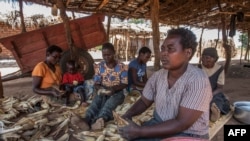A United Nations global report on nutrition says malnutrition is to blame for more than a third of Malawian children who have stunted growth and nearly a quarter of child deaths. To combat the problem, the U.N. and Malawi's President Lazarus Chakwera launched a campaign Thursday to promote child nutrition and health.
The theme for the Scaling Up Nutrition 3.0 Campaign is “Unite to end all forms of malnutrition for sustainable human well-being and economic development.”
Launching the campaign, Malawi President Lazarus Chakwera says Malawi’s high malnutrition rate is largely because most of its citizens are overly dependent on Nsima as the only food.
Nsima is a hard porridge cooked from maize flour and often is eaten with fish, meat and vegetables.
“The painful truth is that those among us, who say, ‘we haven’t really eaten until we have eaten Msima,’ need to rethink our beliefs about nutrition and take seriously the science of how too much Nsima consumption affects our bodies,” he said.
Chakwera said the campaign has provided an opportunity for Malawi to re-engineer its society toward a more diversified diet.
“As a special challenge, I am calling on all of you to replace 10% of your Nsima consumption every year with other and more nutritious food. That kind of discipline and commitment will take all of us to make malnutrition history in our country,” he said.
Dr. Alexander Kalimbira is the associate professor in nutrition at Lilongwe University of Agriculture and Natural Resources.
He said besides the effect on a person’s health, the malnutrition also has resulted in low productivity in Malawi.
“Do we have evidence? And the answer is yes, we do have evidence," he said. "Back in 2012, a study done in Africa; Cost of Hunger in Africa, what shows in the report is that the country, in one year alone. in 2012 lost $597 million U.S. dollars. Your Excellency, this represented at that time 10.3% of our gross domestic product. These are the consequences of malnutrition.”
Chakwera said his government, however, is making efforts to address the problem.
He said this includes the allocation of budgets of local councils, placing malnutrition officers across the country, and providing specialized malnutrition services to all Malawians.
Gerda Verburg is the United Nations assistant secretary-general and also coordinator for the Scaling Up Nutrition 3.0 Movement.
She hailed Malawi for steps it is taking to end malnutrition.
Verburg asked Chakwera, who also is the chairperson of the Southern Africa Community Development, or SADC, to take the campaign beyond Malawi.
“Please bring these inspirational messages and this strategy also to all SADC countries because Malawi is really a frontrunner in the strong commitment and understanding that nutrition is the engine for change and for development,” she said.
Recent government statistics show about 1.5 million Malawians, about 8 percent of the population are currently food insecure.




